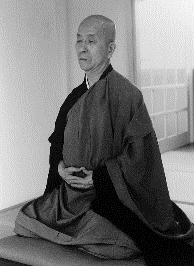Gudō Wafu Nishijima
Gudo Wafu Nishijima | |
|---|---|
 | |
| Title | Roshi |
| Personal life | |
| Born | November 29, 1919 |
| Died | January 28, 2014 (aged 94) |
| Nationality | Japanese |
| Religious life | |
| Religion | Zen Buddhism |
| School | Sōtō |
| Senior posting | |
| Predecessor | Rempo Niwa Roshi |
| Successor | Brad Warner, Jundo Cohen |
| Website | Dogen Sangha Blog |
| Part of a series on |
| Zen Buddhism |
|---|
 |
Gudo Wafu Nishijima (西嶋愚道和夫 Nishijima Gudō Wafu, 29 November 1919 – 28 January 2014) was a Japanese Zen Buddhist priest and teacher.[1]
Biography
As a young man in the early 1940s, Nishijima became a student of the noted Zen teacher Kōdō Sawaki.[2] Shortly after the end of the Second World War, Nishijima received a law degree from Tokyo University and began a career in finance. It was not until 1973, when he was in his mid-fifties, that Nishijima was ordained as a Buddhist priest. His preceptor for this occasion was Rempo Niwa,[2] a former head of the Soto Zen sect. Four years later, Niwa gave him shiho, formally accepting him as one of his successors.[3] Nishijima continued his professional career until 1979.
During the 1960s, Nishijima began giving regular public lectures on Buddhism and Zen meditation. From the 1980s, he lectured in English and had a number of foreign students, including Mike Luetchford, his first Western Dharma Heir and founder of Dogen Sangha UK,[4] Jeffrey Bailey, co-author with Nishijima of 'To Meet the Real Dragon,'[5] American author Brad Warner and teacher Jundo Cohen. In 2007, Nishijima and a group of his students organized as the Dogen Sangha International. In April 2012, Warner dissolved the organization.[6][7]
Nishijima was the author of several books in Japanese and English. He was also a notable translator of Buddhist texts: working with student and Dharma heir Mike Chodo Cross, Nishijima compiled one of three complete English versions of Dōgen's ninety-five-fascicle Kana Shobogenzo; he also translated Dogen's Shinji Shōbōgenzō. He also published an English translation of Nagarjuna's Fundamental Verses of the Middle Way (Mūlamadhyamakakārikā).
Nishijima had not been in good health for several years.[8] It is reported by family that his final words, upon refusing further medical treatment, were, "I decide my death time by myself." Nishijima was often heard to say in teaching that "Life is just the fact in this moment; death is just the fact in this moment."[9]
Three philosophies and one reality
While studying the Shōbōgenzō, Nishijima developed a theory he called "three philosophies and one reality,"[10] which presents his distinctive interpretation of the Four Noble Truths as well as explaining the structure of Dogen's writing. According to Nishijima, Dōgen carefully constructed the Shōbōgenzō according to a fourfold structure, in which he described each issue from four different perspectives. The first perspective is "idealist," "abstract," "spiritual," and "subjective"; Nishijima says this is the correct interpretation of the first Noble Truth (in mainstream Buddhism, the first Noble Truth is dukkha). The second perspective is "concrete," "materialistic," "scientific," and "objective" (in mainstream Buddhism, samudaya). The third perspective is described as an integration of the first two, producing a "realistic" synthesis (mainstream, nirodha). The fourth perspective is reality itself, which Nishijima argues cannot be contained in philosophy or stated in words, but which Dōgen attempts to suggest through poetry and symbolism. In mainstream Buddhism, the fourth Noble Truth is the Eightfold Path.[1]
Nishijima stated that "Buddhism is just Humanism"[11] and he explains Dogen's teaching on zazen in terms of balancing the autonomic nervous system.[12]
English-language books
- How to Practice Zazen (1976), with Joe Langdon
- To Meet the Real Dragon (1984), with Jeffrey Bailey
- Master Dogen's Shinji Shobogenzo (2003)
- A Heart to Heart Chat on Buddhism with Old Master Gudo (2015), with Jundo Cohen
- Master Dogen's Shobogenzo (2006), a complete translation published in 4 Vols., with Chodo Cross
- Fundamental Wisdom of the Middle Way: Nagarjuna's Mulamadhyamakakarika (2011), with Brad Warner
References
- ^ "Obituary: Gudo Wafu Nishijima". Sweeping Zen. Retrieved February 1, 2014.
- ^ a b "Introducing Master Gudo Wafu Nishijima". Dogen Sangha. Retrieved 2005-12-03.
- ^ Nishijima, Gudō Wafu; Cohen, Jundo (2004). A Heart to Heart Chat on Buddhism with Old Master Gudo. PageFree Publishing, Inc. p. 110. ISBN 9781589612129.
- ^ "Dogen Sangha Bristol".
- ^ "To Meet the Real Dragon".
- ^ "Dogen Sangha International is No More". Hardcorezen.blogspot.com.
- ^ "Dogen Sangha International Post Mortem". Hardcorezen.blogspot.com.
- ^ "Announcement". Dogen Sangha Blog.
- ^ "Buddhist Life". The Story of Gudo Wafu Nishijima (Documentary).
- ^ Nishijima Gudo Wafu (1987). "Three Philosophies and One Reality" (pdf). Windbell Publications, Tokyo. Retrieved 2008-04-29.
- ^ Buddhism and Humanism
- ^ The Relation Between the Autonomic Nervous System and Buddhism
External links
- Official blog
- Review of Nishijima's translation of the Shinji Shobogenzo
- Archived 2008-03-27 at the Wayback Machine on the koan "Joshu's dog", along with an excerpt from Dogen's Kana Shobogenzo
- Japanese list of Nishijima's books
